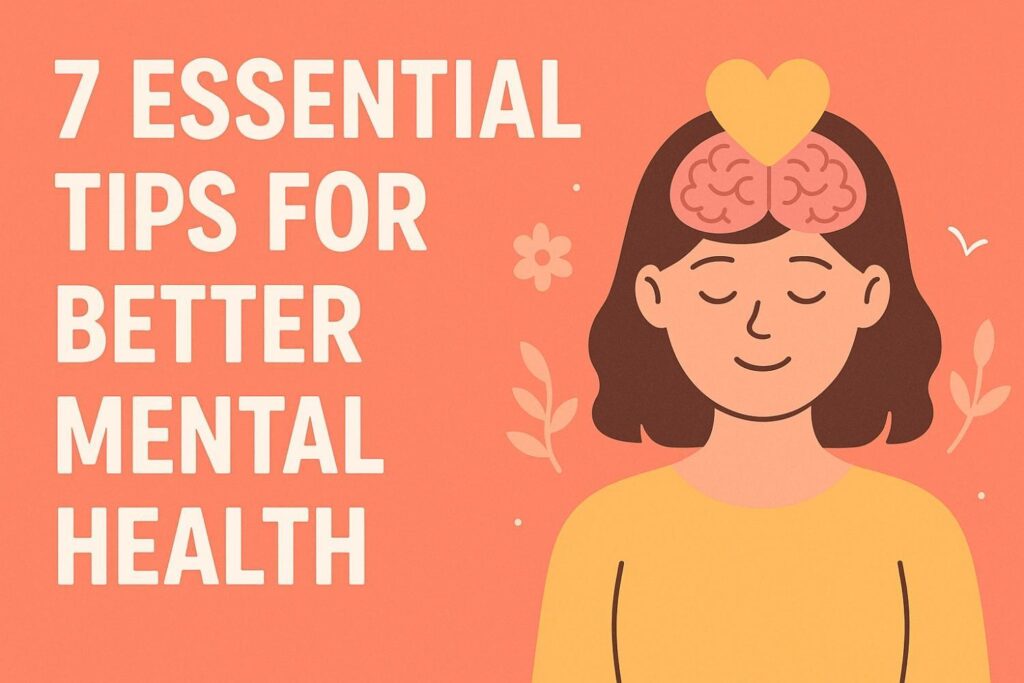 College life can be an exhilarating journey filled with new experiences, opportunities, and challenges. However, the stress and pressure associated with academic pursuits can sometimes lead to mental health challenges. Fortunately, by incorporating a few mindful practices into your daily routine, you can maintain a healthy balance and support your mental well-being. Here, we explore seven essential tips to help boost your mental health while at college.
College life can be an exhilarating journey filled with new experiences, opportunities, and challenges. However, the stress and pressure associated with academic pursuits can sometimes lead to mental health challenges. Fortunately, by incorporating a few mindful practices into your daily routine, you can maintain a healthy balance and support your mental well-being. Here, we explore seven essential tips to help boost your mental health while at college.
1. Establish a Regular Sleep Schedule
Getting enough quality sleep is crucial for both physical health and mental well-being. Poor sleep can negatively impact mood, energy levels, and concentration, making it harder to tackle college demands. Here’s how you can improve your sleep routine:
- Set a Consistent Bedtime: Aim to go to bed and wake up at the same time every day, even on weekends.
- Create a Relaxing Bedtime Routine: Engage in calming activities such as reading or meditating before bed.
- Avoid Stimulants: Limit caffeine and electronic use before bedtime to help your body wind down naturally.
2. Prioritize Physical Activity
Regular physical activity is a proven way to enhance mood and relieve stress. Exercise releases endorphins, which are natural mood lifters, and can improve overall mental health. Here are some tips to incorporate exercise into your college routine:
- Find an Activity You Enjoy: Whether it’s yoga, running, or team sports, choose something you like to stay motivated.
- Schedule Regular Workouts: Treat exercise as an important part of your day by setting aside specific times for it.
- Take Advantage of Campus Facilities: Utilize your college gym or sports clubs to keep your workout routine varied and engaging.
3. Manage Stress Effectively
Stress is an inevitable part of college life, but learning to manage it effectively is essential for mental wellness. Implement these strategies to handle stress better:
- Practice Mindfulness and Meditation: Regular mindfulness practices can help you stay grounded and focused.
- Break Tasks into Smaller Steps: This approach reduces overwhelm by making large tasks more manageable.
- Utilize University Resources: Take advantage of counseling services and stress-management workshops provided by your college.
4. Build a Supportive Network
Having a strong support system can significantly enhance your mental health. Building meaningful relationships with peers, professors, and family members provides a sense of belonging and can help you navigate college life effectively:
- Stay Connected with Family and Friends: Regular check-ins with loved ones can provide the encouragement and support you need.
- Join Student Organizations: Get involved in clubs or groups that align with your interests to meet new people and build connections.
- Seek Peer Support: Find study groups or support networks that focus on shared experiences or challenges.
5. Maintain a Balanced Diet
A nutritious diet is a foundational aspect of mental health. Fueling your body with the right foods can stabilize your mood and improve concentration. Consider these dietary tips:
- Balance Your Meals: Include a variety of fruits, vegetables, proteins, and whole grains in your diet.
- Stay Hydrated: Drink plenty of water throughout the day to keep your body hydrated and alert.
- Avoid Excess Junk Food: While occasional treats are fine, try to minimize consumption of processed and sugary foods.
6. Set Realistic Goals
Setting achievable academic and personal goals not only helps keep you motivated but also reduces stress. Here’s how to set effective goals:
- Be Specific: Clearly define what you want to achieve and how you plan to accomplish it.
- Keep Goals Attainable: Make sure your goals can realistically be completed within the available time frame.
- Track Progress: Regularly assess your goals and adjust as needed to accommodate changes in priorities or circumstances.
7. Make Time for Relaxation and Leisure
Lastly, it’s vital to find time for activities outside of academics that bring you joy and relaxation. Balancing work with play prevents burnout and promotes overall happiness. Consider these ways to unwind:
- Pursue Hobbies: Dedicate time to activities that bring you pleasure and help you relax.
- Take Breaks: Frequent short breaks during study sessions can improve productivity and focus.
- Explore Nature: Spend time outdoors to refresh your mind and enjoy a change of scenery.
By integrating these seven mental health tips into your college life, you can build resilience and ensure a fulfilling, balanced experience. Remember that your mental health is as crucial as your academic achievements, and taking care of it will enhance both your college journey and your future well-being.
